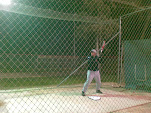The Serial Killer Convert
Scene: You are a judge in a Beis Din (Jewish court), and a man comes to you and says I want to convert to Judaism. But you recognize him, and you realize who he is. He is a serial killer, mass murderer who's killed many people -- many Jews for that matter.
Do you accept him as a convert? Do you even believe him?? Do you think a person like this can even do teshuva?
Kinah 34 ("Yom Achpi") is about the murder of the prophet Zechariyah ben Yehoyada. People started treating King Yeho'ash like a god. When a lot of people tell someone the same thing over and over, he starts believing it, and lo & behold Yeho'ash then started to believe he was god and started to sin, and have people worship him. Along came Zechariyah on Shabbos Yom Kippur to give the people a little mussar to stop worshiping Yeho'ash as a god. Well, of course, Yeho'ash couldn't take any of that, so he ordered the people to stone him to death, and they killed him right there in the Beis Hamikdash, the holiest place on Earth, and with his last breath, Zechariyah asked Hashem to avenge his death.
His blood didn't just go away, or seep into the floor -- it lay there bubbling for 250 years until the Babylonians came to destroy Jerusalem. Nevuzaradan, Nevuchadnezzar's general, saw the blood bubbling on the floor and asked what it was. At first the Jews there lied to him and tried covering up the truth. They finally told him the story of Zechariyah, and he tried to appease the blood, and started killing the Jews. First was the Sanhedrin, then the younger talmidei chachamim, then the kohanim and young kohanim. After he killed 940,000 (!!!) people in all, the blood was still bubbling. He yelled out to the blood, "Zechariyah! Zechariyah! I have killed the best of them! Shall I kill them all??" After that, Zechariyah was appeased and his blood stopped bubbling (Gittin 57b, Sanhendrin 96b).
I've written about this story before, but I've never mentioned the continuation of the story. After listening to R' Aryeh Leibowitz today, I thought of it. After Nevuzaradan killed all those thousands of people, he had a thought: if the Jews, who only killed one man, get punished this greatly, then what about me, who killed many more than they did? My punishment must be 1000 times worse! He then decided to do teshuva (repent), and he converted to Judaism.
Wait...he what? He converted to Judaism? Just like that?? A mass murderer like that?!
Well, yes.
Well, yes.
That is the power of teshuva. In one moment, the worst of the worst can turn it around. Just like that. And that is what Tish'a B'av is about, teshuva. We all know that's what Yom Kippur is all about, but Tish'a B'av too? Again, yes. Because the Jews didn't do teshuva, the Beis Hamikdash was destroyed. One reason we mourn today isn't that 2000 years ago the Beis Hamikdash was destroyed, but that it hasn't been rebult yet. We have the same problem they had -- we keep sinning, and we don't do teshuva. And what better day is there than today to start working on ourselves? It's the day all our problems started in the first place. Just take one characteristic, and work on that, slowly slowly, getting better and better, to just be the best person you can be. That's what life is about -- trying to be the best people we can be, while following Hashem's ways.
I think we say this kinah not just to mourn this great tragedy, the brazen killing of one of our prophets in the Beis Hamikdash, but to show that yes, anyone can do teshuva, and that this is the time for it. To show that yes, we should accept the serial killer if he wants to convert, to do teshuva, because if God could accept Nevazaradan, anyone could be accepted.
And just in case we might think, well, maybe he didn't actually change, the Gemara confirms: "נבוזרדן גר צדק היה" -- he was a righteous convert! He wasn't trying to fool anybody, he actually changed.
If he can, you can. I can. We all can. Even Obama thinks so.
May this Tish'a B'av be the last one of mourning, and by next Tish'a B'av, may we see the Beis Hamikdash rebuilt.
And just in case we might think, well, maybe he didn't actually change, the Gemara confirms: "נבוזרדן גר צדק היה" -- he was a righteous convert! He wasn't trying to fool anybody, he actually changed.
If he can, you can. I can. We all can. Even Obama thinks so.
May this Tish'a B'av be the last one of mourning, and by next Tish'a B'av, may we see the Beis Hamikdash rebuilt.
